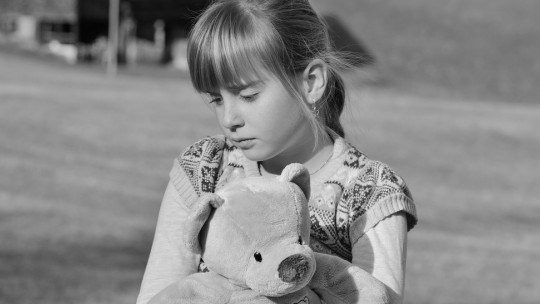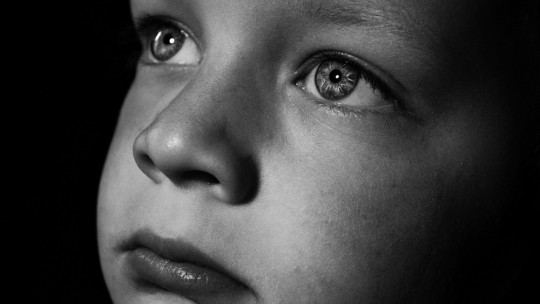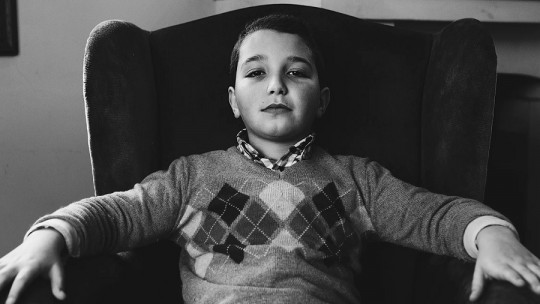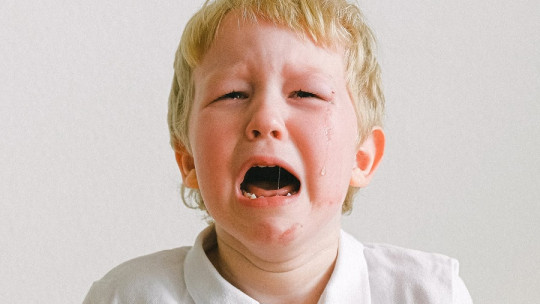
Since affectivity and emotions were placed at the center of scientific discussions, a large part of psychology and pedagogy have been interested in studying how affective experience affects the construction of personality, especially during the early stages of development.
Thus, the affective dimension and its relationship with psychological development in childhood have had an important impact on education. That is why we will present below several signs of lack of affection in boys and girls followed by a brief discussion about the opposite extreme: excess of affection.
The importance of affection in childhood
The affective dimension is currently considered one of the keys to psychological development. In other words, how affection is given and shared has to do with identity development and psychological maturation starting in childhood
Affection, understood here as affinity, approach, sympathy or affection; It is not something that is acquired in isolation. It is a process that takes place while we interact with others, and given that the first people we interact with are our primary caregivers (whether family or not), it is also these caregivers who help us consolidate and give meaning to our emotional experiences; experiences that, when integrated, generate frames of reference and action.
The boy or girl’s immediate environment is the one that presents the world to them; and the type of affection she receives there is the same one she will expect to receive in environments outside of this one. In the same way, the affection that the boy or girl receives in his or her immediate environment is the same that he or she will learn to have as a resource available to offer in other environments.
Thus, the affection that the boy or girl receives from their primary caregivers is an important part of what will help you identify and relate in one way or another beyond your first environment.
4 signs of lack of affection in boys and girls
While all our relationships are mediated by an affective dimension, speaking of lack of affection does not mean that affective responses or emotions have completely disappeared. Rather, it means that these responses are occurring in an insufficient or unreciprocal manner.
Having said that, Lack of affection during childhood can manifest itself in many ways but it is in the social dimension where it is usually most evident, since, through emotions (among other factors) we present ourselves to the world and relate to it.
Thus, four of the signs that may indicate that a boy or girl is in a situation of emotional lack are poor emotional control, conflictive relationships, personal insecurity, and negative self-concept.
1. Little control of your emotions
Perhaps this is the clearest sign that there is a lack of affection. If the boy or girl has had the opportunity to develop in a balanced emotional environment, it is most likely that he or she will recognize the different emotions and the social norms that accompany them.
If the opposite has happened, it is likely that the boy or girl has difficulties, for example, in tolerating frustration or to know how it is appropriate to express anger or vulnerability.
Furthermore, emotional deficiencies can have a different impact on boys and girls. Children are generally educated to be more intolerant of displays of affection, with which they also develop more resources to face a possible emotional lack, at least on a private level. Due to the same gender socialization, it is usually children who have less control over emotions such as anger, in public spaces.
Girls, on the other hand, are generally educated to develop the emotional dimension in an important way, so that they can be empathetic and receptive towards others and towards the needs of others; Therefore, it may be more difficult for them to assimilate these deficiencies, and they channel the lack of affection towards themselves.
2. Isolation or conflictive relationships with peers
In the midst of emotional experiences we establish an approach and a certain type of relationships. For example, we may tend to isolate ourselves or be extroverted, to feel comfortable with hugs when greeting, or to feel uncomfortable in spaces with many people, etc., depending on the emotions we bring into play in each context and according to how we have been socialized
Related to the above, emotional lack can cause the boy or girl to develop little empathy, which can make their interpersonal ties, as well as recognition or respect for other people’s emotions, complicated.
3. Tendency towards insecurity
A good part of the scientific community agrees that the affective dimension is one of the ways through which girls and boys acquire security and build a concept of themselves. Thus, the lack of affection can cause an insecure personality.
This insecurity can manifest itself through defensive behavior, or through a withdrawal due to fear of facing new situations that generate emotions over which the child does not feel control or which seem strange to him or her.
For the same reason, a significant lack of affection can lead to excessive submission to rules and a rigid, anxious personality ; or the opposite, constant challenging behaviors and no respect for other people’s limits, since these would be the most accessible ways for the boy or girl to compensate for the insecurity felt and thus maintain a feeling of certainty that relieves them.
4. Negative self-concept and recurrent guilt
Related to the previous point, the affective dimension has an important impact on the opinion we form about ourselves. The lack of affection conveys a message of little or no self-recognition
That is to say, it can cause value judgments about themselves to be more negative than positive, or that they insist on blaming themselves for everything negative that happens around them.
Lack of affection vs. excessive affection
Unfortunately emotional deprivation can have some undesirable consequences for boys and girls both at the individual (psychological) level and at the level of interpersonal relationships.
However, it is important to look for alternatives considering that, in many circumstances, caregivers are incapable of offering a stable emotional structure for reasons beyond them.
For example, the great deficiencies in care practices that have emerged after recent socioeconomic transformations; that have forced family and productive roles to be rearranged and have transformed the responsibilities of those who have been traditional caregivers.
Given this, different spaces and compensatory practices are generated. For example, formal education and The role of teachers has recently been positioned as an important source of affection
On the other hand, one of the most common compensatory practices is for caregivers to try to compensate for emotional deficiencies through excessive material rewards, such as toys or electronic devices.
Of course the material and recreational dimension is necessary, however, it is important to know that these elements do not have the same symbolic and corporal effect that affection has, therefore, they do not represent a definitive long-term substitute.
Finally, and in contrast to the lack of affection, many boys and girls are in an excessive emotional situation Given this, it is important to recognize that excessive affection, or overprotection (for example, when absolutely everything is resolved for them for fear that they will become frustrated), has the same psychological effect as a lack of affection or abandonment: the message is transmitted to them. that they are beings incapable of relating and responding to the world, which creates helplessness and can generate the signals that we developed previously.








